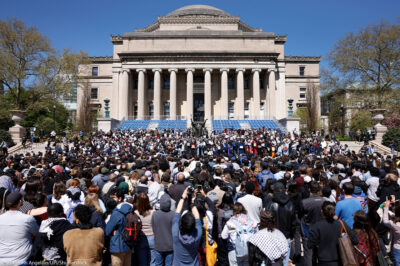Settlement Reached in Case of Cops Who Took Camera From Protester
HARTFORD, Conn. – A lawsuit brought by the ACLU of Connecticut on behalf of protester Michael Picard against three Connecticut State Police employees who were caught on camera appearing to confiscate his camera and give him unwarranted tickets has settled. According to the agreement, the State of Connecticut agreed to pay Picard approximately $1,800 for every minute that the defendants detained him (a total of $50,000), in exchange for his dismissing the lawsuit.
“In a free society, it is normal and necessary for people to protest the government, including police. If police violate people’s fundamental right to peacefully protest, those police employees should be held accountable. In addition to the human costs of poor police behavior, there can also be financial costs for taxpayers. I hope my story sends a message to police departments that they cannot ignore the Constitution without consequences,” said Picard.
“We are pleased that Michael’s case has ended in a fair agreement,” said Dan Barrett, legal director of the ACLU of Connecticut and the attorney representing Picard in the case. “Michael was exercising his peaceful, lawful right to protest when Connecticut State Police seized his camera without a warrant and undermined his First Amendment right to protest and record them. Police must understand, and this agreement shows, that they ultimately must answer to the Constitution.”
On September 11, 2015, Picard was protesting near a police DUI checkpoint in West Hartford. One of the defendants, John Barone, approached him under the pretext of public complaints and confiscated Picard’s camera and lawfully carried pistol. Unbeknownst to the troopers, the camera was recording when Barone brought it to where co-defendants Patrick Torneo and John Jacobi were talking.
In footage that later became viral, with the camera rolling, the police appeared to: call a Hartford police officer to see if he had any “grudges” against Picard; open an investigation of him in the police database; and discuss a separate protest that they thought he had organized at the state capitol. After Barone announced “we gotta cover our ass,” either Torneo or Jacobi stated “let’s give him something,” and the three settled on two criminal infraction tickets that they issued to Picard. Those criminal charges were later dismissed.
In a September 16, 2019, ruling, the U.S. District Court for the District of Connecticut ordered Barone, Torneo, and Jacobi to stand trial in the case.
Picard was represented by ACLU of Connecticut legal director Dan Barrett, ACLU of Connecticut staff attorney Elana Bildner, and attorney Joseph R. Sastre, who defended Picard against the criminal charges.
For a copy of the settlement agreement: https://www.acluct.org/sites/default/files/field_documents/2020-01-10_picard_v_barone_et_al_executed_settlement_agreement.pdf
For more information about the case, including footage of the incident and a copy of the 2016 complaint filed in U.S. District Court: https://www.acluct.org/en/cases/picard-v-torneo-jacobi-barone
Stay Informed
Every month, you'll receive regular roundups of the most important civil rights and civil liberties developments. Remember: a well-informed citizenry is the best defense against tyranny.


